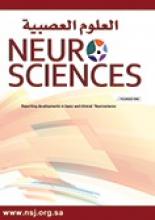Systematic ReviewSystematic Review
Open Access
The potential role of nutritional components in improving brain function among patients with Alzheimer’s disease: a meta-analysis of RCT studies
Tarfa Albrahim
Neurosciences Journal January 2020, 25 (1) 4-17; DOI: https://doi.org/10.17712/nsj.2020.1.20190037
Tarfa Albrahim
From the College of Health and Rehabilitation Sciences, Department of Health Sciences, Clinical Nutrition, Princess Nourah Bint Abdulrahman University, Riyadh, Kingdom of Saudi Arabia.
PhD.
References
- ↵
- Solfrizzi V,
- Panza F,
- Frisardi V,
- Seripa D,
- Logroscino G,
- Imbimbo BP,
- et al.
- ↵
- ↵
- ↵
- World Health Organization
- ↵
- ↵
- Tolppanen AM,
- Taipale H,
- Hartikainen S
- ↵
- ↵
- ↵
- ↵
- Fenech M
- Boccardi V,
- Baroni M,
- Mangialasche F,
- Mecocci P
- ↵
- Licher S,
- de Bruijn R,
- Wolters FJ,
- Zillikens MC,
- Ikram MA,
- Ikram MK
- ↵
- Sawda C,
- Moussa C,
- Turner RS
- ↵
- ↵
- ↵
- ↵
- Barnard ND,
- Bunner AE,
- Agarwal U
- ↵
- Henderson ST
- ↵
- ↵
- Sofi F,
- Cesari F,
- Abbate R,
- Gensini GF,
- Casini A
- ↵
- Dysken MW,
- Sano M,
- Asthana S,
- Vertrees JE,
- Pallaki M,
- Llorente M,
- et al.
- ↵
- ↵
- ↵
- ↵
- de Waal H,
- Stam CJ,
- Lansbergen MM,
- Wieggers RL,
- Kamphuis PJ,
- Scheltens P,
- et al.
- ↵
- Shinto L,
- Quinn J,
- Montine T,
- Dodge HH,
- Woodward W,
- Baldauf-Wagner S,
- et al.
- ↵
- ↵
- Quinn JF,
- Raman R,
- Thomas RG,
- Yurko-Mauro K,
- Nelson EB,
- Van Dyck C,
- et al.
- ↵
- ↵
- ↵
- ↵
- ↵
- ↵
- Scheltens P,
- Kamphuis PJ,
- Verhey FR,
- Olde Rikkert MG,
- Wurtman RJ,
- Wilkinson D,
- et al.
- ↵
- ↵
- Scheltens P,
- Twisk JW,
- Blesa R,
- Scarpini E,
- von Arnim CA,
- Bongers A,
- et al.
- ↵
- Douaud G,
- Refsum H,
- de Jager CA,
- Jacoby R,
- Nichols TE,
- Smith SM,
- et al.
- ↵
- ↵
- ↵
- ↵
- Hu N,
- Yu JT,
- Tan L,
- Wang YL,
- Sun L,
- Tan L
- ↵
- Gibson TM,
- Ferrucci LM,
- Tangrea JA,
- Schatzkin A
In this issue
The potential role of nutritional components in improving brain function among patients with Alzheimer’s disease: a meta-analysis of RCT studies
Tarfa Albrahim
Neurosciences Journal Jan 2020, 25 (1) 4-17; DOI: 10.17712/nsj.2020.1.20190037
Jump to section
Related Articles
- No related articles found.
Cited By...
- No citing articles found.





